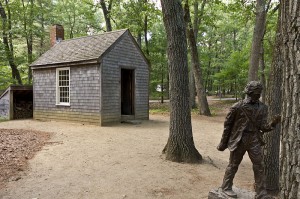by Ashton Nichols
Thoreau Farm, and its new blog outlet, “The Roost,” are important sources for information about the links between human life and the natural world. These are the same links that Henry David Thoreau worked so hard to explore and explain in the nineteenth century. My latest book, Beyond Romantic Ecocriticism: Toward Urbanatural Roosting (Palgrave Macmillan, 2011) explores a number of those links in detail. Most importantly, I argue that we need a new concept, and a new word to describe that concept. The new word we need is “urbanature.” The concept this word describes is the idea that nature and urban life are not as distinct as we have long supposed. Here is why.
Hawks are roosting on skyscrapers near Central Park East and Central Park West. Peregrine falcons are feeding on the Flatiron Building, and owls are nesting throughout Manhattan. Meanwhile, thousands of environmentalists board carbon-gulping airplanes and fly thousands of miles (carrying tons of Gore-Tex) to get “back to nature” in Montana. At the same time, the World Wide Web tells us that Thoreau said, “In wilderness is the preservation of the world.” Over 600 websites say so. But Thoreau did not say, “In wilderness is the preservation of the world.” He said, “In wildness is the preservation of the world.” This difference–”wildness,” not “wilderness”–makes all the difference.
Urbanature (rhymes with “furniture”) is the idea that all human and nonhuman lives, all animate and inanimate objects on our planet (and no doubt beyond) are linked in a complex web of interconnectedness. We are not out of nature when we stand in the streets of Manhattan any more than we are in nature when we stand above tree-line in the Montana Rockies. When nature-lovers say they long to return to nature, they are making what the philosophers call a category mistake. As Tyler Stalling has recently noted, “There is no ‘real nature’ to which to return. Rather, in the face of burgeoning technologies such as nanotechnology and genetic manipulation, the once defined border between nature and culture is obsolete.”
We are never fully cut off from wild nature by human culture. This is the central aspect of all true ecology. Nothing we can do can ever take us out of nature. There is nowhere for us to go. We are natural beings from the moment we are biologically born until the moment we organically die. Instead of describing the nonhuman world anthropocentrically—in human terms—we now have many good reasons to describe the whole world ecocentrically [eco-: oikos, house]. Our nonhuman, natural house is the same place as our fully human, cultural home.
Urbanature includes the biggest of big pictures: birds on buildings, fish in fishponds, chemists making medicines, mountaineers climbing mountains, every dolphin and domestic dog, every gust of solar wind and every galaxy. To be “natural” originally meant, “to have been born”: natura—“birth” and also “essence,” as in “the nature of the problem.” The human-made is no less natural because it has been shaped, no less born or essential because it has been fashioned by human hands. The bird makes a nest, and her nest is no less natural than the bird herself. Human hands make a house, and the house–or even the skyscraper–is no less natural than the human hands that shaped it.
Thoreau fits with this idea so well because his hut at Walden Pond was a mere mile-and-a-half from Concord. He could walk into town for dinner with his mother or a conversation with Emerson. Indeed, he was arrested and spent his famous single night in jail during his two “wild” years at Walden. These details are important because–along with his successors: Aldo Leopold, Edward Abbey, Annie Dillard, and Terry Tempest Williams, to name just a few–Thoreau and these other nature writers remind us that life away from the urban world is only part of the nature-writing story.
Urban culture and wild nature come to much the same thing: Urbanature.
Ashton Nichols is the holder of the Walter E. Beach ’56 Distinguished Chair in Sustainability Studies & a Professor of English Language and Literature at Dickinson College.
—————————————————————————————–
–See:
http://www.amazon.com/Beyond-Romantic-Ecocriticism-Urbanatural-Nineteenth-Century/dp/1137033991/ref=tmm_pap_swatch_0?_encoding=UTF8&sr=&qid=
for more details.

